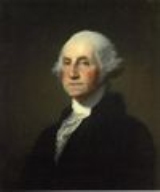
in the American Revolutionary War
as commander-in-chief of the Continental Army
from 1775 to 1783, and presided over the writing of the Constitution
in 1787. The unanimous choice to serve as the first President of the United States
(1789–1797), Washington presided over the creation of a strong, well-financed national government that stayed neutral in the wars raging in Europe, suppressed rebellion and won acceptance among Americans of all types.
1754 French and Indian War: in the first engagement of the war, Virginia militia under 22-year-old Lieutenant Colonel George Washington defeat a French reconnaissance party in the Battle of Jumonville Glen in what is now Fayette County in southwestern Pennsylvania.
1754 French and Indian War: George Washington surrenders Fort Necessity to French forces.
1754 French and Indian War: George Washington surrenders Fort Necessity to French Capt. Louis Coulon de Villiers.
1759 George Washington marries Martha Dandridge Custis.
1775 American Revolutionary War: George Washington is appointed commander-in-chief of the Continental Army.
1775 American Revolutionary War: George Washington takes command of the Continental Army at Cambridge, Massachusetts.
1776 American Revolution: British forces evacuate Boston, Massachusetts after George Washington and Henry Knox place artillery in positions overlooking the city.
1776 American Revolutionary War: Thomas Hickey, Continental Army private and bodyguard to General George Washington, is hanged for mutiny and sedition.
1776 The Battle of Long Island: in what is now Brooklyn, New York, British forces under General William Howe defeat Americans under General George Washington.
1776 George Washington and his army cross the Delaware River to attack the Kingdom of Great Britain's Hessian mercenaries in Trenton, New Jersey.
Nothing is a greater stranger to my breast, or a sin that my soul more abhors, than that black and detestable one, ingratitude.![]()
There is a Destiny which has the control of our actions, not to be resisted by the strongest efforts of Human Nature.![]()
But lest some unlucky event should happen unfavorable to my reputation, I beg it may be remembered by every gentleman in the room that I this day declare with the utmost sincerity, I do not think myself equal to the command I am honored with.![]()
Discipline is the soul of an army. It makes small numbers formidable; procures success to the weak, and esteem to all.![]()
Every post is honorable in which a man can serve his country. ![]()
To expect ... the same service from raw and undisciplined recruits, as from veteran soldiers, is to expect what never did and perhaps never will happen. Men, who are familiarized to danger, meet it without shrinking; whereas troops unused to service often apprehend danger where no danger is.![]()
Let us therefore animate and encourage each other, and show the whole world that a Freeman, contending for liberty on his own ground, is superior to any slavish mercenary on earth.![]()

